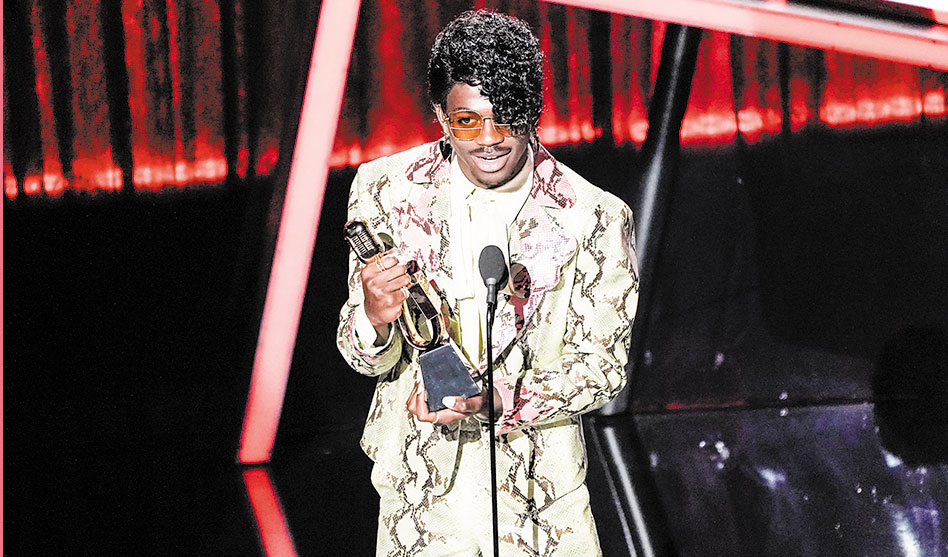Lil Nas X accepts the award for top hot 100 song for “Old Town Road” at the Billboard Music Awards last October. As a gay Black rapper with a hit country-western song, LNX was already in outside the norm. His latest hit single, “Montero (Call Me By Your Name)” cements his outlaw status. (AP Photo/Chris Pizzello)
Outlaw by default, celebrity by design
 “Mister, don’t take this the wrong way, but are you gay or bi?” a student asked during the last minutes of class.
“Mister, don’t take this the wrong way, but are you gay or bi?” a student asked during the last minutes of class.
“Yes,” I answered without elaboration.
“Which one?”
I paused, then answered, “Why do you ask?”
“You just … dress weird. Like, who wears a shirt like that?”
I looked down at my shirt. I was wearing a burnt sienna waffle knit with burgundy slacks, a business-casual outfit I felt perfectly respectable for work. Yet it seemed to my 13-year-old student a dead giveaway of a secret perversity.
In our ensuing dialogue, the student told me he had asked his art teacher the same question, and she had answered affirmatively. This surprised him; he could’ve sworn she liked guys. After all, she liked bright colors and pastels!
You never know with girls, he told me, but not with guys. And he promised me he would never turn gay. I told him he need not worry about turning gay; then I added ominously as the dismissal bell rang and he rushed out, “Unless you are.”
Sexuality is a topic I am loath to discuss with my students, yet they often bring it up. Queerness is something almost normal — except for those adults who frown on it. The children all know someone queer, whether in person or through representation.
On the ground, though, reality skews one way: Girls are more open about their queer identities than are the boys. When it comes to the boys, I often have to rely on context clues — not dissimilar from my own middle school days.
The Overton window of acceptable behavior for men remains fixed vehemently rightward, discouraging homosexuality in a way it doesn’t seem to for women. It is not a surprising phenomenon: Female homosexuality can still cater to the male gaze, whereas male homosexuality challenges the heteronormative gaze, causing men to look away in either disgust or, worse, fear that they might like it.
They, too, might run out of the door the minute the alarm bell rings.
Take, for example, the recent controversy over Lil Nas X and his song “Montero (Call Me By Your Name)” and, especially the video for the song. In the video, against hyperpop cacophony and simmering flamenco, Montero is seduced by the Biblical serpent and stoned to death for sodomy before pole dancing down to Hell and onto Satan’s lap. Then Montero breaks Satan’s neck and dons his crown, dark angelic wings bursting out of Montero’s back in the martini shot.
The video advocates finding power and agency, even in the ghettos society banishes you to when you are different. It is a message alluding to both Black empowerment and queer liberation. It is an overdue attempt to shift the Overton window leftward and normalize same-sex lust in pop music, a sentiment made explicit by the artist.
The video, of course, inspired a predictable rightwing backlash — all over a video whose sum parts I have seen before. Brendon Urie transformed into Satan in the music video for “Emperor’s New Clothes” six years ago; Miley Cyrus angered parents by dancing on a stripper pole during a performance of “Party in the USA” 12 years ago, and Nicki Minaj lap danced in the “Super Bass” music video released just a year later. And we haven’t even mentioned Netflix’ recent Chilling Adventures of Sabrina series, in which a white girl literally becomes the queen of Hell.
“Montero” is simply a culmination of pop history thus far and its logical conclusion. Along the way LNX forces us to contend with the contradictions of that same pop history: its dark underbelly of racism and homophobia.
Complicating LNX’ situation is a unique intersection: the diametrical worlds of country and hip-hop, each with their own expectations of the 22-year-old artist from Georgia. Sure, it didn’t matter if Britney kissed Madonna or danced, scantily clad, with a boa constrictor. That was for publicity, canonized in the two decades since then as “iconic.” But a gay Black man kisses a CGI serpent (Aaliyah also famously played with snakes, might I add), and suddenly it’s not just about publicity, nor is it immediately iconic. It’s just notorious.
Precisely when the pop-star becomes not an abstract object of sexual attraction and admiration but someone whose identity is anathema to established ideals is when publicity crosses over to notoriety. The line in between is the sweet spot, keeping audiences on the edge of their seats, expectant. Britney rode that line in her ascent, embodying both the Madonna and the Whore from the onset of her 1998 debut single until crossing the threshold in 2007.
LNX has always similarly straddled that line of notoriety since his inescapable summer hit of 2019, “Old Town Road.” Until now.
The country-rap track was the first display of incongruence in his identity. Released late 2018, “Old Town Road” snowballed into a phenomenon by summertime — helped along by a feature appearance by Billie Ray Cyrus. Country stations didn’t know what to make of the song; Billboard pulled it off the Hot Country Songs chart at No. 19, all the while it peaked at No. 1 on the Hot 100 for a record-breaking 19 weeks.
Also worth noting: LNX came out while his song was atop the Hot 100, putting a further wrinkle in any support from Nashville and, with the constraints placed on Black masculinity, from mainstream rap audiences. Yet the song seemed to quench something, a thirst hearkening back to famous country outlaws of bygone days.
“Waylon Jennings said to me, ‘Take this as a compliment,’ means you’re doing something great!” Cyrus tweeted on April 3, 2019, referring to LNX.
“Only Outlaws are outlawed. Welcome to the club!”
And yet, I must ask: Why was “Old Town Road” considered outlaw? Certainly not because of its tame lyrical content. Something else was at play here.
The Overton window already hewn to the right, intersectional identities further limit acceptable social behaviors, pushing LNX into notoriety for simply existing, making him an outlaw simply by virtue of his Black and queer identities.
This is something he is well aware of, something he leans into, his persona bordering on satire and parody — defining features of Generation Z, or more broadly, internet humor.
Attempting to understanding LNX’ success brings us back full circle to this next generation. The summer when “Old Town Road” reigned supreme, my younger cousins from the Philippines loved the song from halfway across the world, outside the cultural context of either country or rap. It is worth noting the song initially gained traction on TikTok, the preferred social media app of the younger Generation Z, before its entry into the Billboard charts.
Only when I think again of this generation of children unafraid to ask their teachers about sexuality do I realize that, in that generation, the window is still widening.
As of April 13 this year, two weeks after the release of “Montero,” LNX tweeted concerns about his song being taken out of streaming services — a claim echoed by his label Columbia but denied by Billboard shortly after, as the song sits atop the Global 200 for the second week. Regardless of the substance of his concern, LNX continues to court controversy to his benefit. Attention is money these days, and as a child raised by the Internet, LNX knows all too well how to play the game — an unsurprising and rather admirable fact to those of us born at the tail end of last millennium.
Rashid Eldoma is an educator in Arlington and an incoming law student at Texas A&M University School of Law in Fort Worth.













